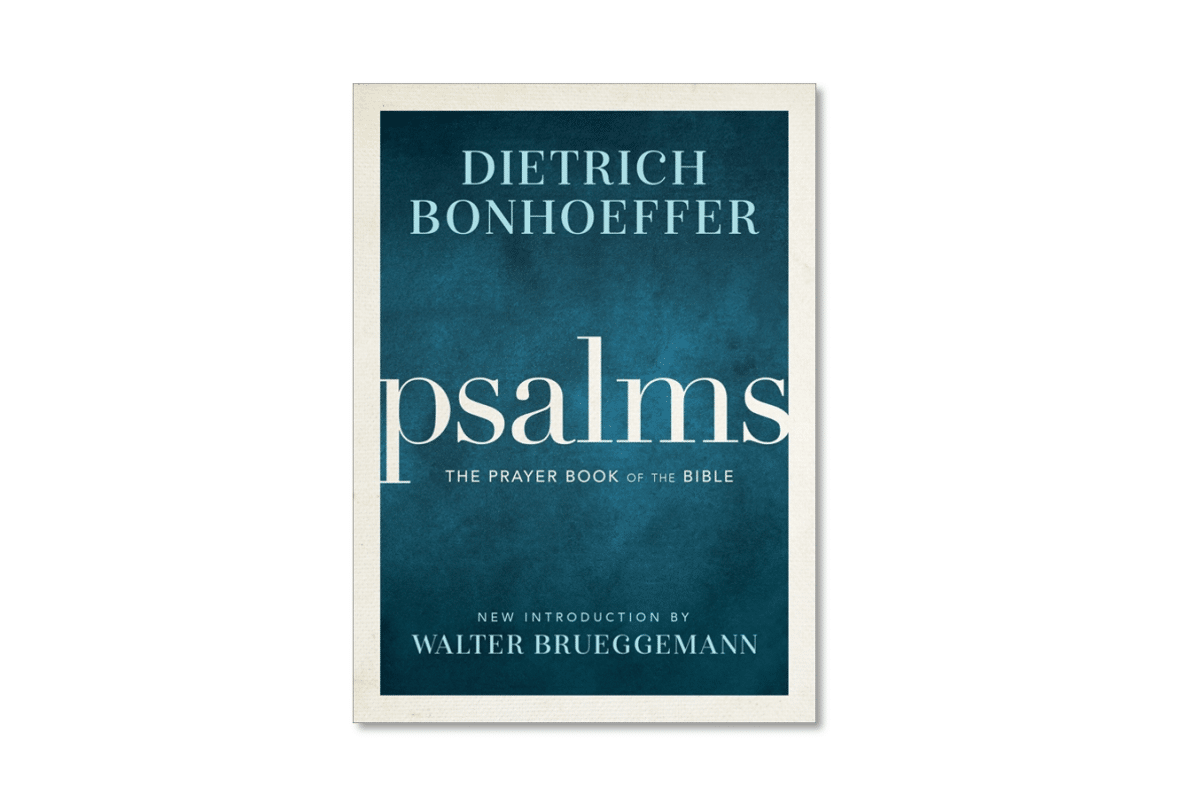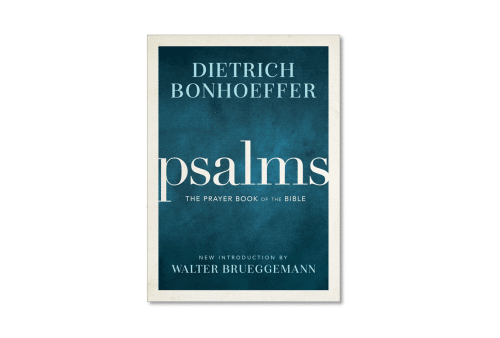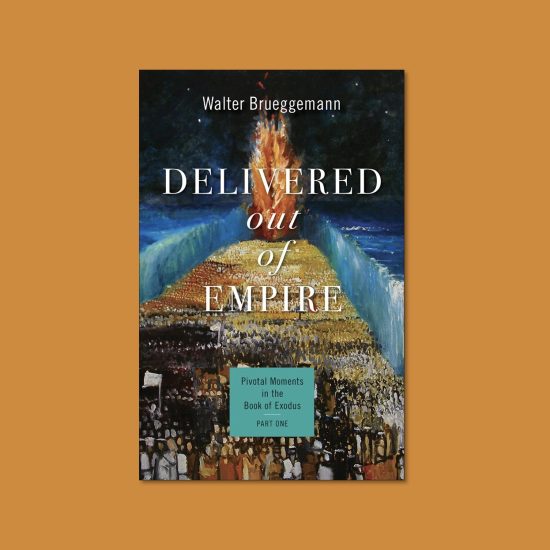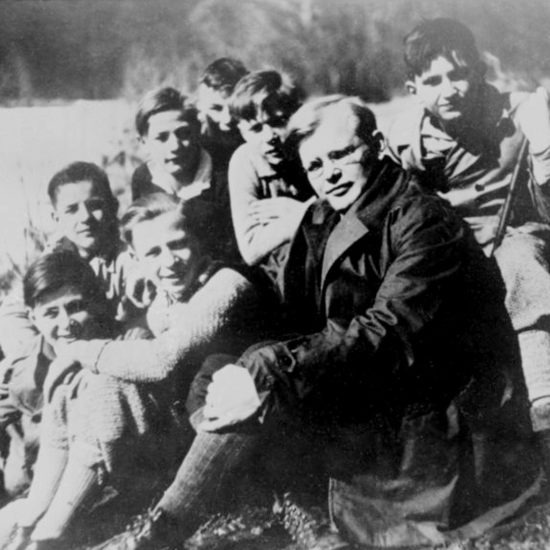

PSALMS: The Prayer Book of the Bible. By Dietrich Bonhoeffer. New Introduction by Walter Brueggemann. Minneapolis, MN: Broadleaf Books, 2022. 98 pages.
The Psalms have always played a significant role in both Jewish and Christian life. For much of Christian history, they have served as the primary hymnbook. As such, the Psalms have provided prayers and hymns that speak to the divine-human relationship. Traditionally attributed to David, even though the Psalter itself attributes many of the Psalms to other sources, such as Asaph. Modern biblical scholarship will allow the possibility of some Davidic authorship, but it questions many of the Davidic attributions. While that might true, it doesn’t take away from the power of the Psalms, which continue to speak to our hearts. In any case, the figure of David stands over these songs, even as Moses stands over the Torah/Pentateuch. Figures from Augustine to Luther to Calvin have reflected on these songs, finding in them inspiration for the Christian faith. As for modern interpreters, none is as well-known as Dietrich Bonhoeffer. In more modern times, none other than Dietrich Bonhoeffer has offered a reflection on the Psalms for our use.

Robert D. Cornwall
This is not a lengthy book (less than seventy pages of text by Bonhoeffer in this new publication). While Bonhoeffer published his brief reflection on the Psalms in 1940, likely the last work he had published before the German government placed a ban on his publications, it has been available in English translations beginning in 1970 with a paperback published in 1974 (I purchased my copy of that edition back in the 1980s). The translator for this edition was James Burtness. Although a new edition of the Prayerbook of the Bible was made available as part of volume five of Fortress Press’s Dietrich Bonhoeffer Works (together with Life Together), Broadleaf Books has once again made available the Burtness translation for the reader desiring an affordable and compact version of the text. While Burtness is the translator for the DBW edition, the DBW edition is accompanied by a scholarly apparatus that might not be necessary for a reader who is simply interested in reading what Bonhoeffer has to say about the Psalms. What makes this edition different from the earlier version is that it carries a new introduction by Walter Brueggemann. Thus, this edition makes for a nice resource to keep close at hand as one reads the Psalms.
There are a couple of things that mark Bonhoeffer’s brief reflections on the Psalms. First, he emphasizes the role the Psalms play in Christian life as a book of prayers. He invites the reader to read the Psalms with the question that led Jesus to offer the Lord’s Prayer as a guide to prayer: “Lord teach us to pray.” In Bonhoeffer’s view, the Psalms should be read, at least by Christians, through the lens offered by the Lord’s Prayer. That is, it should be read Christologically. He writes that “If we want to read and to pray the prayers of the Bible and especially the psalms, therefore, we must not ask first what they have to do with us, but what they have to do with Jesus Christ” (p. 14). While Bonhoeffer was thoroughly trained in the historical-critical method of biblical interpretation (he was a student of German liberals—Adolph Harnack, Reinhold Seeberg, and Karl Holl), in his book on the Psalms he reads them as if they are Davidic in origin. He notes that of the 150 Psalms, seventy-three are attributed to David, twelve to the children of Korah, two to Solomon, and one to another set of people, whom Bonhoeffer suggests were employed by David and Solomon. While acknowledging that not all the Psalms came from David’s hand, he believed we can read them fruitfully and prayerfully as if the Psalter comes to us from David. Not only that, but “it is important to note that even David did not pray out of the personal exuberance of his heart, but out of the Christ who dwelled in him.” (p. 19).
If you are looking for a critical analysis of the Psalms, you won’t find it here. What you will find are brief comments about how to pray in the name of Jesus (Lord’s Prayer), who himself prays the Psalms. He also speaks about the musical forms that the Psalms take and how they fit into worship. He focuses briefly on a method of classifying the Psalms. As such, he offers up eight categories—Creation, Law, Holy History, the Messiah (remember this is a Christological reading), the Church (again this is a Christian reading), Life, Suffering, Guilt, and Enemies (imprecatory Psalms). Concerning this last category, Bonhoeffer acknowledges that no category of Psalms gives the reader greater difficulty today than the imprecatory psalms. When it comes to praying the imprecatory psalms—prayers against one’s enemies—Bonhoeffer suggested that the key to praying them is to use the cross of Christ as the lens because “only in the cross of Jesus Christ is the love of God to be found” (p. 69). That is, since only the crucified Christ can forgive enemies we must pray for our enemies in Christ, using these Psalms to express our concerns.
Bonhoeffer concludes his reflections on the Psalms by acknowledging the eschatological nature of the faith. That is, he suggests that the Psalms speak to the reality of death and God’s final victory in Christ. With that in mind, he writes about a prayer for the Spirit of Life to be made present in the current moment. Finally, he ends by offering a word of encouragement to participate in morning prayers, which determines the day. Thus, we have the Prayer Book of the Bible to guide us.
As with the original 1970 edition of the book, the publisher has chosen to include a brief biography of Bonhoeffer by Eberhard Bethge. While Bethge wrote a lengthy biography and several recent biographies have been published (the best are by Ferdinand Schlingensiepen and Charles Marsh; please avoid the Metaxas pseudo-biography), in just a few pages Bethge sets out the key points of Bonhoeffer’s life and sets the book on the Psalms in context.
This leads us to what makes this edition different, which is the new introduction by Walter Brueggemann. In his introduction, Brueggemann helpfully points out that while Bonhoeffer surely was familiar with the scholarly/critical analysis that was available for reading the Psalms, Bonhoeffer chose to embrace a traditional reading in this edition that affirms first that “David prayed the Psalms.” Secondly “Jesus prayed the Psalms after David.” And third, “we pray the Psalms after Jesus, and with Jesus, and through Jesus.” (p. 3). In this introduction, Brueggemann helps us see how this small book fits into Bonhoeffer’s deep spirituality where prayer is foundational (see Bonhoeffer’s Life Together). Brueggemann concludes that “the sum of Bonhoeffer’s study is that the book of Psalms is converted from a collection of ‘nice’ poems of spirituality to a vigorous articulation of faith. The daily practice of praying the Psalms thus cannot be simply a comfortable devotional exercise. Rather, it is the reframing of all of life toward the rule of Christ.” (p. 6).
This edition of Bonhoeffer’s Psalms is designed to serve as a spiritual companion to one’s prayer life. It is unencumbered by the scholarly apparatus found in the Dietrich Bonhoeffer Works and thus might be less intimidating to the general reader. It is a nicely laid out edition, that one can carry in a small backpack. If I have one question for the editors of this edition it is why they occasionally make use of readings from the English Standard Version for some of the scriptural passages, especially in the sidebars. I ask this because the foundational text is assumed to be the NRSV. Nevertheless, this is a good place to start if you’ve not read Bonhoeffer before. You might follow up with Life Together, which offers Bonhoeffer’s insights into the Christian life. From there, there is much to explore.
This review originally appeared on BobCornwall.com.
Robert D. Cornwall is an ordained minister in the Christian Church (Disciples of Christ). Now retired from his ministry at Central Woodward Christian Church (Disciples of Christ) of Troy, Michigan, he serves as Minister-at-Large in Troy. He holds a Ph.D. in Historical Theology from Fuller Theological Seminary and is the author of numerous books including his latest books: Called to Bless: Finding Hope by Reclaiming Our Spiritual Roots (Cascade Books, 2021) and Unfettered Spirit: Spiritual Gifts for the New Great Awakening, 2nd Edition, (Energion Publications, 2021). His blog Ponderings on a Faith Journey can be found at www.bobcornwall.com.





